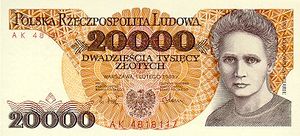Marie Curie
Marie Curie (7 November 1867 – 4 July 1934) was a French (originally Polish) scientist, Nobel Laureate and housewife. Though her contribution has been grossly overstated, Curie is universally recognised as being the only woman ever to make a significant contribution to science (or any other field of any importance).
Early life
Marie was born a female and, as such, from an early age showed little interest and less ability in the fields of science and technology. The reason for this is that, being a girl, young Marie did not possess a Y-chromosome, which is the location of the so-called 'science gene' – the gene responsible for scientific ability. She did, however, display an uncommon talent for playing with dolls.
Unfortunately for her, she was required to study science at school. Marie soon learned that she could cheat her way through science exams and homework by performing sexual favours, which ranged from holding hands (in elementary school) to unspeakable depravity (in high school). Her real talent, it has emerged from her memoirs, was for cookery (euphemistically called Domestic Science) and drawing pretty pictures of bunnies (also known as Art & Design).
University
Due to her dishonesty, she gained a reputation for scientific ability, with the result that she was offered a scholarship at the University of Paris. Her parents, seizing the opportunity to have a successful child (her older brother had embarrassed her family by opening an opium den), encouraged her to accept, which she did. She studied under (quite literally) the well-respected Professor Jacques Fontaine.
While at university, Marie relied almost exclusively on a gifted young student named Pierre Curie to complete her assignments and to help her cheat in examinations. One fateful day, Pierre delivered an ultimatum to Marie in a brief letter:
Look, either marry me, or I'll tell everyone that you're a fraud. I've been doing your assignments for three years now and I've never got so much as a peck on the cheek, yet you've been with practically everyone on campus.
Within a week the pair were married and, after 'finishing' her degree, Curie turned to her true calling as a housewife. They moved into an apartment in Paris.
Discovery
One day, approximately two years into their marriage, Marie was rooting through their attic for an ironing board cover. She came across a box marked Samples and her curiosity drove her to explore it further. Turning out the contents onto the attic floor, she looked at the assorted objects with a wide-eyed wonder not unlike that of a child at a fireworks display.
One object in particular caught her eye and she took it to Pierre to ask him what it was. He was unsure and took it away for further testing. It turned out to be an entirely new element, which Pierre named radium after the way Marie used to mispronounce 'radiation' at university [1]
Partly as a joke and partly in recognition of her noticing the sample and making him quiche while he was working, Pierre decided to include Marie's name on the report when he published his findings to the world. This was immediately seized upon by the press because it was as unusual then as it is now for a woman to contribute to human knowledge.
Nobel Prize
This worldwide media coverage caught the attention of the Nobel Committee who, in what is widely regarded as the first act of tokenism, decided to award her the Nobel Prize for Physics. Due to a mix-up, there was not enough room to accommodate all of the prize winners (Curie insisted upon bringing a large entourage with her) and so, to save space, the Nobel Committee decided to also award her the prize for Chemistry, making her the only person ever to win two Nobel Prizes.
At the ceremony, Curie made a rather confusing and rambling speech. Below is an extract:
"...so we invented radium, anyway, and like, we don't think its very radiumactive. That means that the radium doesn't admit a lot of radium, you know, alpha radium and beta radium and gamma radium don't really come out of radium. But, like, I dunno. We might be wrong."
Business

Following her Nobel Prize success, the Curies began frantically promoting radium as a panacea for all ills. Madame Curie's Radium Miracle Medicine was marketed as ”a tonic for cancer, heart disease, impotence, demonic possession, radiation sickness and general illness.” Having patented the chemical formula for radium, the pair also made large sums of money by suing rich businessmen who were found to have traces of radium or radon (a derivative product) in their products or factories.
Death
Unbeknownst to the couple, the object responsible for their success was also to be responsible for their downfall. In a cruelly ironic twist, radium turned out to be dangerously radioactive and ultimately proved fatal for Marie and Pierre. The couple had taken to having daily radium baths and radium soup[2] for a starter with every meal. As a result of this, their health deteriorated rapidly and caused their eventual deaths from radiation poisoning. The autopsy report described them as being ”more cancer than human”.
Tributes
With the rise of the feminist movement in the 1960s, Curie's contribution to science has repeatedly been the subject of revisionism, with the result that she is now credited with discovering 90% of the elements on the periodic table, including Einsteinium, which is named after her pet lizard.
She is simultaneously regarded as a French and Polish hero (and, oddly, a Fijian hero as well). She was recently named as the greatest Pole ever to live (though it is suggested that this has more due to the paucity of Polish war heroes than anything else).



